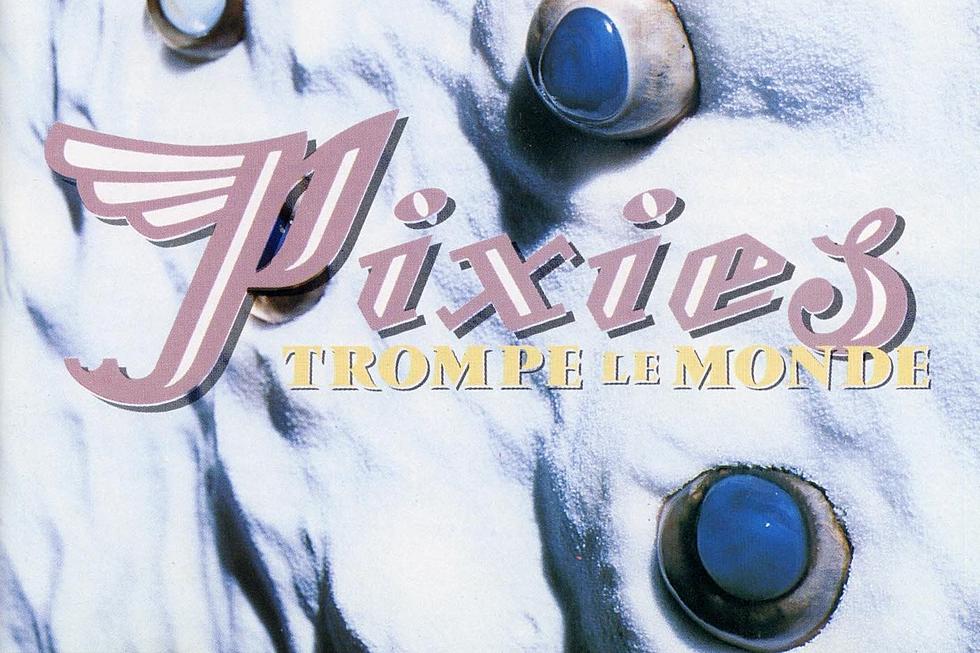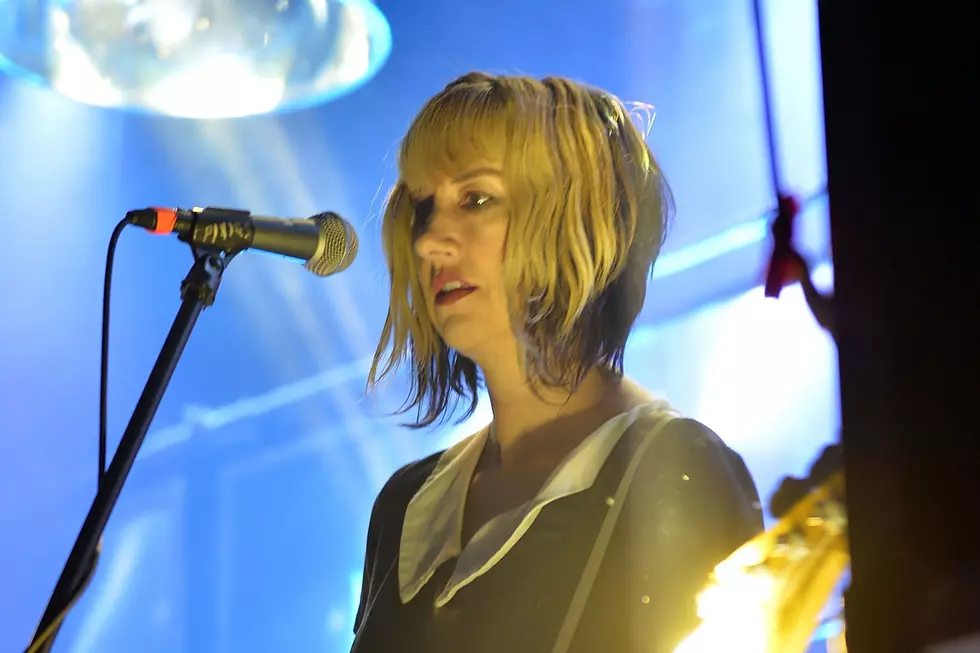
30 Years Ago: How ‘Trompe le Monde’ Pointed to Pixies’ Split
Pixies were falling apart. Early proof could be found on Trompe le Monde, which arrived Sept. 23, 1991, with scarcely any notable contributions from Kim Deal.
This sad conclusion was as dispiriting as it was surprising. They'd only recently moved from strength to strength on 1988's Surfer Rosa and 1989's Doolittle, melding frontman Black Francis' deliriously senseless lyrical approach, Deal's girding bass and airy call-and-response vocals, furious guitar shredding by Joey Santiago and David Lovering's striking tempo shifts.
Bossanova didn't sell as many in 1990, but it charted higher that the platinum-certified Doolittle – especially in the U.K., where the Pixies' third LP soared to No. 3. Trompe le Monde was followed by an invite to open for U2 on their sprawling Zoo TV tour.
So, how did Pixies so quickly run out of time, patience and – worst of all – steam?
"Our concerts were still full, but we weren't ascending or anything. Maybe we were getting a little boring," Francis told Spin 10 years later. "We were on this boring tour — nothing against U2, but an opening slot is thankless. We were not getting much of a reaction and feeling a little tense, especially me. I needed to get away from that band and those people."
Founded in Boston in 1986, Pixies first found fame overseas and never quite became a mainstream band in their home country. What they did instead was kick down the last remaining door between the so-called college rock of the '80s and the wave of alternative rock to come in the next decade.
They inspired countless bands. A knack for following contemplative verses with foundation-cracking choruses, in particular, inspired their most influential fan, Kurt Cobain of Nirvana, to soft-loud greatness.
Listen to Pixies' 'Letter to Memphis'
Along the way, Deal was credited with only two cowrites ("Gigantic" on Surfer Rosa and "Silver" on Doolittle), as Francis – born Charles Michael Kittredge Thompson IV – took the creative reins. Instead, at least initially, Deal worked as the perfect foil, a key counterbalance.
Then Francis, Santiago and Lovering moved to Los Angeles in advance of Bossanova, while the restless Deal stayed in the U.K. to complete a debut project from the Breeders, a new side project focusing on her own work. She and Francis weren't getting along; he was said to have thrown a guitar at her during a show in Stuttgart. By the time they got to the next show three nights later, Pixies had begun to crumble.
"Kim was headstrong and wanted to include her own songs, to explore her own world," Santiago told Mojo in 1997. "Before we made Bossanova, we were even going to fire her, after a gig in Frankfurt where we found her hanging out in her hotel room, with no intention of playing. But our lawyer convinced us to try and work it out, to give her a warning or something."
Santiago added: "Kim couldn't believe I'd be party to it, but I told her she didn't seem happy, so why hang around? In the end, Kim realized it was Charles' bag, that he was the singer – but they kinda stopped talking after that."
Perhaps unsurprisingly, Trompe le Monde came off like something made by a quarreling couple that still lives together but only in stony silence.
Deal's presence was "less every time, especially when we did Trompe le Monde," producer Gil Norton lamented in Spin. "I wasn't happy by the end of that, because there was one song, 'Bird Dream of the Olympus Mons,' that I thought was perfect for her to sing. Charles didn't want her to sing it. He definitely didn't want her to have a big imprint on the songs."
Listen to Pixies' 'Planet of Sound'
Fans still rallied around the hobbled Pixies. "Planet of Sound" became a Top 30 hit in the U.K., while "Letter to Memphis" and a cover of the Jesus and Mary Chain song "Head On" both reached No. 6 on the Billboard Modern Rock Tracks chart. But Francis often sounded like he'd rather be in outer space than dealing with the real-world issues consuming his band.
The most revealing song might just be "U-Mass," with its narrative return to the college campus where Francis first met Santiago. The riff dated back to that time, too, long before Deal was a part of things.
"Kim and I just didn't get along well after a time," Francis later mused. "She always had her own ambitions and became comfortable in a leadership role in her other band. It must have been hard for her to be in a band where some other guy was always pulling at the reins."
The first leg of U2's Zoo TV tour ended in April 1992 in Vancouver. So – for all intents and purposes – did Pixies, though nobody knew it just yet.
"We all just went home," Santiago told Mojo. "Everybody was under the impression that we were taking a year off, like a sabbatical, but it never came to that. Charles started doing his own album, as Frank Black, and Kim started doing the Breeders."
Deal said she never had a clear idea on what was going on with Pixies. She was in San Francisco, working on the her side band's second studio record when she heard Pixies were no more.
"Charles said something about taking a sabbatical. I was like, 'Oh, for how long?' And he goes, 'I believe a sabbatical is one year,'" Deal told Spin. "And that's the last conversation we had, the last time we talked, and the last sentence was, 'I believe a sabbatical is one year.' Asshole. I don't want to hurt anybody's feelings, but that's a fucking stupid last sentence."
Listen to Pixies' 'U-Mass'
Santiago said he got a direct phone call from Francis with the news. The others, however, were reportedly contacted by fax – setting off a firestorm of controversy.
"Charles called out of the blue, at my girlfriend's house, to say he was splitting the band, and that he had faxed Kim and Dave," Santiago told Mojo. "You'd really have to ask Charles why he broke it up. I think he'd tell you that it was normal, that bands don't last forever. Maybe he just liked being Frank Black rather than Black Francis or felt he had to move forward. But I'm sure the tension between Kim and Charles had something to do with it."
Francis hadn't spoken to Deal in some time and apparently wasn't about to start. "If I would have called a meeting or something, then it would have just kind of devolved into this big discussion," he told The New York Times in 2004. "'Oh, come on, Charles. Don't do this right now.' And I just wasn't up for that. I was just, like, I'm done. I'm done. Goodbye. There's no discussion, you know what I mean?"
Both Francis and Deal still had more to say – Last Splash would become the Breeders' best-selling album, while Frank Black was a Top 10 U.K. hit – just not to each other.
"It wasn't like we ended up fist-fighting or arguing constantly," Santiago told Mojo. "It was more unspoken tension. Kim phoned me and said, 'Did you know that the Pixies just broke up?' and I replied, 'I'd be more surprised if we got back together.'"
They did, though it was almost a dozen years later. Initially, Deal was part of the lineup as they mounted a series of well-received reunion tours. They even released a song written and sung by Deal, "Bam Thwok." But a full-length album never materialized during this era, and by 2013 she had departed again.
Top 100 '80s Rock Albums
More From Classic Rock Q107






